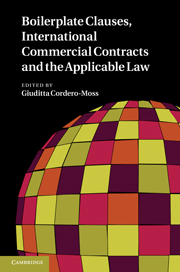Book contents
- Frontmatter
- Contents
- List of contributors
- Preface
- Introduction
- PART 1 How contracts are written in practice
- PART 2 Methodological challenges
- PART 3 The applicable law's effects on boilerplate clauses
- Introduction to Part 3
- 7 The common law tradition: application of boilerplate clauses under English law
- 8 The Germanic tradition: application of boilerplate clauses under German law
- 9 The Romanistic tradition: application of boilerplate clauses under French law
- 10 The Romanistic tradition: application of boilerplate clauses under Italian law
- 11 The Nordic tradition: application of boilerplate clauses under Danish law
- 12 The Nordic tradition: application of boilerplate clauses under Finnish Law
- 13 The Nordic tradition: application of boilerplate clauses under Norwegian law
- 14 The Nordic tradition: application of boilerplate clauses under Swedish law
- 15 The East European tradition: application of boilerplate clauses under Hungarian law
- 16 The East European tradition: application of boilerplate clauses under Russian law
- Conclusion: the self-sufficient contract, uniformly interpreted on the basis of its own terms: an illusion, but not fully useless
- Bibliography
- Index
14 - The Nordic tradition: application of boilerplate clauses under Swedish law
from PART 3 - The applicable law's effects on boilerplate clauses
Published online by Cambridge University Press: 11 April 2011
- Frontmatter
- Contents
- List of contributors
- Preface
- Introduction
- PART 1 How contracts are written in practice
- PART 2 Methodological challenges
- PART 3 The applicable law's effects on boilerplate clauses
- Introduction to Part 3
- 7 The common law tradition: application of boilerplate clauses under English law
- 8 The Germanic tradition: application of boilerplate clauses under German law
- 9 The Romanistic tradition: application of boilerplate clauses under French law
- 10 The Romanistic tradition: application of boilerplate clauses under Italian law
- 11 The Nordic tradition: application of boilerplate clauses under Danish law
- 12 The Nordic tradition: application of boilerplate clauses under Finnish Law
- 13 The Nordic tradition: application of boilerplate clauses under Norwegian law
- 14 The Nordic tradition: application of boilerplate clauses under Swedish law
- 15 The East European tradition: application of boilerplate clauses under Hungarian law
- 16 The East European tradition: application of boilerplate clauses under Russian law
- Conclusion: the self-sufficient contract, uniformly interpreted on the basis of its own terms: an illusion, but not fully useless
- Bibliography
- Index
Summary
General background
Scandinavian law is often regarded by comparative lawyers as one particular group under the civil law family. There is no common Scandinavian law, except for particular parts of contract law and the law of obligations. There is a common Scandinavian approach in several respects and there is thus some common legislation. This is particularly true within parts of private law, the particular area of law covered in this book.
Following Nordic legislative cooperation at the end of the nineteenth and the first half of the twentieth centuries, a substantial amount of private law legislation from this period is common or similar in the different Scandinavian countries. Thus, for example, the Maritime Codes from the 1890s, the Sales of Goods Acts from the early-twentieth century, the Contracts Acts from around 1915–1920 and the Acts on Promissory Notes from the end of the 1930s were more or less common. Apart from the Maritime Codes of the 1990s, which are largely common for all the Nordic countries, the situation has partly changed. Thus, for example, in spite of all Nordic countries having adhered to the United Nations (Vienna) Convention on Contracts for the International Sale of Goods (CISG), there are currently differences between the Nordic Sales of Goods Acts. Some amendments have been made to the Contracts Acts, the most important amendment being that regarding §36, the so-called general clause. In Sweden, this amendment was made in 1976.
- Type
- Chapter
- Information
- Publisher: Cambridge University PressPrint publication year: 2011



